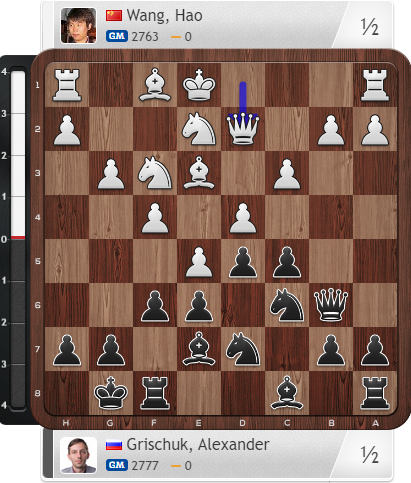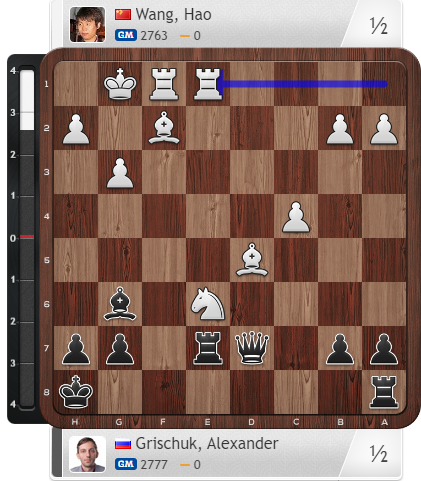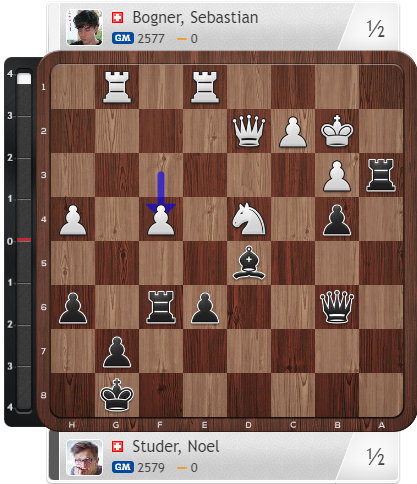It is one of the most frustrating feelings in chess. You play a great game, but then you get into time trouble and one wrong decision costs you the full point.
Even though you played more good moves than your opponent, you end up losing the game. It certainly feels unfair, but that is how our Sport is. One single slip can cause so much pain.
As even the best player can make a mistake in time trouble, the most effective solution is to avoid time trouble altogether!
I have struggled my whole career with time shortness. Especially in important games I slow down on every move and end up in huge time trouble, which often costs me the point.
After implementing some easy hacks during the games, as well as in training, but also working on my mental barriers, my time management has become much better.
But before we get to the strategies, let’s dive a bit deeper into the problem of time trouble.
Time Trouble Addicts
The most known example of a time trouble addict is GM Alexander Grischuk. He is an extremely strong player and has been in the Top 25 of the World since January 2002! But even stronger than his chess moves seems to be his addiction to time trouble.
In the recent Candidates Tournament, he had one of the longest thinking times for one single move in the history of competitive chess.

After an absolutely shocking 1 hour and 12 Minutes, Grischuk played 11…cxd4. I am absolutely certain he would play the exact same move in any bullet game!
It is furthermore possible that 11…cxd4 was the only move he was calculating during this whole time.
The funniest thing in the story is that Wang Hao replied with 12.Nfxd4, a move that Grischuk did not consider at all, as Grischuk stated in the press conference.
Inevitably, Grischuk ended up in huge time trouble and messed up his advantage:

Black needs to kick away the knight on e6 to exchange some material and win the game.
He can either do it with 29…Bf5 or 29…Bf7. With seconds on the clock, Grischuk decided on 29…Bf7? and he got hit by the amazing 30.Nxg7!.
The bishop on f7 will hang in all the lines: Rxe1 32.Bxe1! Kxg7 33.Rxf7+ or Kxg7 32.Bd4+ Kg8 33.Rxe7 Qxe7 34.Rxf7.
After 29…Bf5 white needs to retreat with 30.Nc5, when Black should slowly convert his material advantage.
With only some minutes on the clock, Grischuk would have found that small difference.
Who knows if he might even have had a chance to win the Candidates’ tournament with the boost of this win.
If you don’t want to mess up all of your hard work, then please don’t pull a Grischuk and find a way to avoid time trouble. I will show you exactly how.
Understand The Mental Barriers Behind Time Trouble
Before I provide you with my best tips & strategies, you must understand why time trouble happens in the first place. Everybody is different, but some predominant schemes lead to time trouble.
For a long time, I had no real understanding of why I was getting into time trouble. I just tried to follow many strategies, but somehow it did not click.
Only by understanding the psychology behind my slower play, could I act accordingly.
So, let’s dive into the main causes of time trouble and solve them one by one. In the end, I will provide you with more general Tips & strategies. Each of them you can implement very easily when playing OTB games.
1) Fear Of Making A Mistake
I guess you know this feeling. Instead of simply thinking about your next move, thoughts about the result start to cloud your thinking.
“What if I miss something” or “What if I mess it all up now” are frequent thoughts. Instead of calculating lines, you start to see ghosts everywhere.
As I said earlier, I especially struggled with time trouble in important games. Why?
Because in these games I focus more on the outcome and do not want to make any mistakes at all. Every line I calculate is a potential danger for a mistake.
Never Decide Because Of Fear
I actually lost my World Cup Qualification because of pure fear.
After an extremely nice game with black in a must-win situation, I was only some moves away from the full point and my World Cup Ticket.

All my last moves were preparing for an attack on the white king. In a panic moment, I suddenly got extremely scared of a potential sacrifice or mate on g7. This seems utterly ridiculous now, but the threat felt totally real during the game.
Instead of playing 39…Qa5, which is totally winning, I played the overly defensive Ra7? I wanted to over-protect g7, just in case I miss something. All my planning before was for nothing. After 40.Ra1 white took over the a-file and I was lost only 2 moves later!
The fear was present already in the game and that is why I had only seconds for this decision.
Not only did the fear lead to my time trouble, but it also directly affected my choice in time trouble!
This is not only very bad for your game, but also for your heart. The stress this fear induces is horrible. And nobody should have that constant fear of committing a mistake.
If you happen to have that same fear (at least partially), the greatest strategies will not help anything. Why? Because your fear will be stronger than any strategy.
I know that I should not double or triple-check every line. But if I am afraid to commit a mistake, the fear will basically overwrite my conscious knowledge.
So, there is only one solution. Stopping that fear. And here is what helped me (I am a work in progress, but it was much worse before).
If you want to dive deeper into fear-based thinking, then read my full article on it.
Fear Setting To Avoid Time Trouble
One exercise that really helped me is fear-setting by Tim Ferriss. He has done a Ted Talk about it that I highly recommend. I have refined it a little to fit our purpose.
This is something you should do frequently before games or at home. Do it anytime your fear comes up (a quick hack during the game is following shortly). And here is how it works.
- Write down the worst-case scenario of a tournament or game. Usually, this is a loss or a non-qualification of some sort. What could be the consequences of it? Get your fantasy going.
- Now that you have the absolute worst-case scenario in front of you, ask yourself what is NOT impacted by this worst-case scenario. This usually opens my eyes to how unimportant one game is after all.
- Remind yourself of one case that was close to this worst-case scenario. I’m sure you already suffered tough losses. But you are still alive and kicking. As Seneca says, we suffer more often in imagination than in reality.
Here is what this might look like for me:
- Worst-case scenario: Losing the game and missing out on the World Cup Qualification spot. I will miss out on a great opportunity to play in the World Cup. I might end up never playing in the World Cup again. My career will be finished.
- Even if this is pretty bad, my loved ones are still there for me. I am healthy and have warm food on the table every day. My cat is still alive and the same crazy kitten she has always been. I will sleep in a warm bed tonight.
- I have lost 6 games in a row in Biel 2017. It was a horrible experience, but I learned a lot from it. I got through that, so I will definitely get through any other painful experience.
After doing this, I already feel much better. After all, by writing down this worst-case scenario I have to laugh.
In my mind, it might be logical and scary, but once you bring it to paper it loses substance. My career will not be over, even if I do not qualify for the World Cup this year.
It is just a small bump on a long road.
Understand You Have Luxury Problems
Another method that works pretty well is understanding that you have extremely nice problems and fears.
Some people don’t know if they get enough food today and you shit your pants about making a wrong move in chess (myself included).
I still remember my mindset switch at the Accentus Young Masters 2020.
After winning game 1, I lost two games in a row. I was feeling pretty bad. And as often happens when I have some bad games, I started doubting every single decision.
Already during preparation, I was scared to lose the following game. “No way I go 0/3″, ” Not again losing 6 in a row as in Biel 2017″.
Then I remembered I took Victor Frankl’s “Man’s Search for Meaning” with me to this tournament. And in just 10 Minutes, my mood completely changed.
How could I feel so scared about losing a fucking game of chess, while others managed to keep their spirit up in the Auschwitz concentration camp?
I decided I should just enjoy the games and trust myself. What followed were 5 wins and 2 draws against strong Grandmasters. In one game, I even sacrificed more than a rook for a mating attack.
The mindset switch was real and truly helped me to play well and worry less.
Both these techniques have something in common: when we are too self-centered about our chess, it can feel like our whole life depends on one game.
The moment we can zoom out and see it just for what it is, one single game of chess, we regain control over the fear.
2) Perfectionism Leads To Time Trouble
This is linked to the fear of making a mistake, but still different. Perfectionism is very nicely explained in one of my favorite chess books: The 7 deadly Chess sins, by Jonathan Rowson. I wholeheartedly recommend reading that book.
The perfectionist approach means overthinking, even if we already have a very good solution.
You see a good move that leads to a nice advantage, but you still think for 20 more minutes to find something even stronger.
This search for perfection is pushed by the use of Engines. In one second, we will see every mistake we did after the game.
If you study too much with an Engine, you lose the practical touch.
After all, chess is still a game. A fight between two human beings. There will always be mistakes!
Let’s tell ourselves over and over again:
It is impossible to avoid making mistakes.
Chess is too complicated to play perfect games.
And much more important, it is not necessary to play perfectly!

This quote from Andre Agassi in his fantastic book “Open” has opened my eyes. He always tried to hit the line, taking risks on every shot. This either led to extremely classy wins or catastrophic defeats.
But once he understood he just has to be a bit better than his opponent, he relaxed and could hit some good shots. Not perfect, simply good. But consistent. And mostly that is enough.
It does not matter who makes the more brilliant moves. Usually, the player with fewer grave mistakes will win the game!
What counts is constantly playing good moves. Not playing some brilliant moves and then making blunders because of time shortage.
Be A Practical Player To Avoid Time Trouble
Chess is such a rich game. Nobody can solve all the problems over the board. So we need to think practically.
If you struggle with time trouble a lot, you are not the most practical player. But what are the traits of a practical player?
A practical Player:
- Uses his time mainly in critical positions
- Trusts his intuition and plays logical moves quickly
- Plays forced and only moves instantly (check for 5 seconds if it really is a forced move!)
- Plays his preparation quickly and does not second guess his work at home
Set yourself a reminder to be a practical player before every game. You can also include it in your pre-game routine, which is what I often do.
3) Lack Of Focus
Without true focus, you will lose a lot of time. If your mind wanders during the game, it is a sign that you should change something.
The underlining problem is usually the following: you simply have too many things on your plate.
Your mind is wandering because you have hundreds of open logs in the back of your mind.
From an upcoming business meeting to an unresolved conflict, or the thought of a tasty dinner in the evening. There are always more things asking for your attention.
The more things you do the morning before the game, the bigger the risk of distraction during the game.
Your mind does not have unlimited energy. If you overuse it before the game, you will not be able to concentrate.
This phenomenon is also called decision fatigue. Your ability to make decisions gets worse after making many decisions.
That is why you should never prepare for more than 2 hours before a game. And if you can, do NOT work before a classical game.
It is better to play fewer, but only play when you can really focus on your game.
Here are some more practical tips to improve your focus during a game:
- Take selected breaks; the rhythm of 25 Minutes concentration and 5 Minutes break is recommended by brain Coach Jim Kwik. Do NOT use your brain energy to check other games. Try to fully relax and take some fresh air.
- Don’t forget good nutrition. If your stomach is digesting a big meal, chances are your brain feels foggy. Don’t over-eat before the game and drink enough water.
- Control your breath. This might sound a bit woo-woo, but it makes a big difference. Check out your breath. If you breathe calmly and deeply you are in a good position to focus. With a shallow breath, your brain does not get enough oxygen and can not focus well.
- Start to meditate (not during the game please…). Meditation is a perfect way to learn to cope with distractions. I started two years ago and am still using Headspace daily.
Now that you can:
- Understand and Control your Fear
- Be a practical player instead of a Perfectionist
- Improve your Focus
you are ready for my additional practical Tips to resolve time trouble problems!
Practical Tips During The Game To Resolve Time Trouble
These Tips can improve your time management. But only in combination with the deeper psychological knowledge explained above can they really stop your time trouble issues.
1) Be On Time
Coming too late to the game is not only disrespectful but also stupid. I really do not see any advantage.
The disadvantage is clear though: you lose time that you could use later on in the game.
To avoid being too late, make a time plan for the last hour before the game.
If you are notoriously late, you need to trick yourself into being on time.
Instead of planning to be at the board 1 Minute before the start of the game, plan to be there at least 10 minutes before.
2) Trust Your Opening Preparation
It is very unlikely that you find a better move over the board than you did find in your home preparation. So make sure you remember your opening correctly, but then play your moves quickly.
A good rhythm is to take between 10 and 20 seconds per move if you are still in the book. It is enough time to make sure you really remember correctly and not waste any precious time.
3) Write Down Your Time Usage
This is an easy way to see where you are losing unnecessary time. After every move, write down the time you still have on the clock.
Like this, you can track your time usage after the game.
Make it a habit to write down the time starting from move 1. This needs to be something automatic. Whenever I do not write the time for the first moves, I am prone to forget to write down the time later on.
It is much easier to do something always than “only when it is important”.
4) Use the 15 Minute Rule
It is extremely seldom that you produce some new thoughts after some time of thinking. You get tired and start seeing ghosts. This not only wastes time but usually leads to a worse decision.
That’s why my Coach GM Markus Ragger came up with the “15-Minute Rule”. Whenever I realize I am thinking for more than 15 Minutes I need to ask myself the following question:
What is the logical move here?
If there is nothing particularly wrong with the most logical move, I need to play it. That not only saves me from wasting more time, but also from making very strange decisions.
5) Think On Your Opponent’s Time
I know it is fun to walk around the playing hall whenever your opponent is thinking. But especially, if you come into time trouble often, this is something you have to cut down to the minimum.
I promise you it feels even nicer to check the other games online after you finished with a win. Follow this easy rule I came up with to save time:
I am only allowed to stand up from my board if I know the reply to my opponent’s most logical move.
So whenever you have the instinct to leave your board, ask yourself: am I sure of my reply to his most logical move?
If you can answer it with yes (and then also play that move in less than a minute!) then you are allowed to leave the board.
Conclusion
The combination of deep knowledge of your psychological barriers with easy practical tips should be the end to your time trouble.
Obviously, your tendency will not change immediately. This needs time and some practice.
Use the practical tips to get some early wins. Then use this motivation to do deep work on your psychological barriers.
The combination will drastically improve your time management. And with time also your results.
Now let me know if you have any other best practices to avoid time trouble?
I would love to hear and learn from you!
Sincerely,
Noël
P.S.: If you liked this article, then you will probably also like my FREE Guide to organizing your Chess training. Get it here.